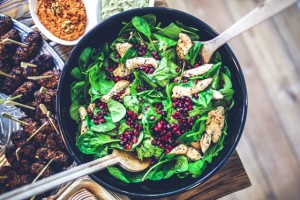Green leafy vegetables
Green leafy vegetables are rich in folate. Low folate levels have been linked to depression. Good sources of folate include lettuce, spinach, kale, asparagus, broccoli, Brussel sprouts, celery, and cabbage. Other good sources of folate include beets, pinto beans, black beans, navy beans, papaya, strawberries, and bell peppers.
Whole grains
Eating whole grains provides the brain with the proper energy the brain needs to function. Whole grains give the blood within our body glucose which is sent to the brain. Whole grains are better than refined grains because the energy from whole grains is steady and lasts longer, as opposed to refined grains which provides energy that spikes up and down and does not last as long. Make sure to choose whole grain foods that have a low glycemic index. Brown rice, brown pasta, brown cereals, and whole wheat or whole grain bread are good sources of whole grains.
Walnuts contain alpha linolenic acid, which helps promote blood flow and oxygen to the brain. Walnuts also contain omega-3 fatty acids and can help fight depression.
Oily fish
Oily fish contain omega-3 fatty acids. Because our bodies cannot make omega-3 fatty acids naturally, we must get them from food sources. The best sources of oily fish include salmon, trout, mackerel, herring, sardines, pilchards and kippers. Other good sources of omega-3 fatty acids besides fish include flaxseed oil, soya bean oil, pumpkin seeds, walnut oil and soya beans.
Tomatoes
Tomatoes are rich in a powerful antioxidant called lycopene. Lycopene has been found to help protect against free radical damage in cells within the brain. Damage to free radical cells within the brain can lead to dementia or Alzheimer’s disease.
Lean meats
Lean meats such as certain beef, chicken, and pork contain an important amino acid called tyrosine. Adding more tyrosine to your diet can help increase the levels of dopamine and norepinephrine which can help increase mental focus and alertness.
Vitamins
Adding vitamins to your diet such as B6, b12, and folic acid can help reduce the amount of homocysteine in the blood. Increased levels of homocysteine in the blood have been linked to an increased risk of Alzheimer’s disease, stroke, and cognitive impairment. Vitamin B12 also helps fight depression and insomnia.
Water
Drinking plenty of water keeps you hydrated. Being dehydrated can cause fatigue and low energy. Aim to drink at least six to eight glasses of cold water a day.





I think this is an important and relevant post for everyone. All individuals can benefit from eating healthier and more nutritiously. Some people may not realize the benefits of some of the foods on your list, so I think this list truly holds a lot of value. I think it’s important to note that these foods are great for energy levels, overall health, and well being, even more than just brain health, which is also imperative to one’s health. The foods on this list also taste great, making us all the more likely to eat them!
Eating raw vegetables and fruits is definitely more healthy than vitamin pills.